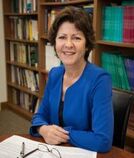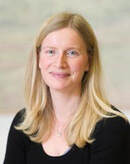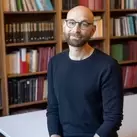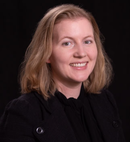Collaborators

Dr. Sara Bufferd
Dr. Bufferd (she/her) is the Director of the Child Anxiety and Mood Lab and Associate Professor in the Department of Psychological and Brain Sciences at the University of Louisville. She is also the Director of Clinical Training (DCT) for the Department’s Ph.D. program in Clinical Psychology. Previously, Dr. Bufferd was Assistant then Associate Professor of Psychology at California State University San Marcos from 2012-2019.
Dr. Bufferd (she/her) is the Director of the Child Anxiety and Mood Lab and Associate Professor in the Department of Psychological and Brain Sciences at the University of Louisville. She is also the Director of Clinical Training (DCT) for the Department’s Ph.D. program in Clinical Psychology. Previously, Dr. Bufferd was Assistant then Associate Professor of Psychology at California State University San Marcos from 2012-2019.

Dr. Cynthia Bulik
Dr. Cynthia Bulik is a consultant on the Personalized Treatment and CBT-E Study. Dr. Bulik is the Founding Director of the University of North Carolina Center of Excellence for Eating Disorders and the founder and director of the Centre for Eating Disorders Innovation at Karolinska Institutet in Stockholm, Sweden.
Dr. Cynthia Bulik is a consultant on the Personalized Treatment and CBT-E Study. Dr. Bulik is the Founding Director of the University of North Carolina Center of Excellence for Eating Disorders and the founder and director of the Centre for Eating Disorders Innovation at Karolinska Institutet in Stockholm, Sweden.

Dr. Elizabeth Cash
Dr. Elizabeth Cash is a co-investigator on the Predicting Recovery study. Dr. Cash is an Associate Professor and Director of Research at the University of Louisville's Department of Otolaryngology and Communicative Disorders. Her research is centered around understanding mechanisms linking psychological experience with effects on biology. She has extensive experience in research involving actigraphy and momentary ambulatory assessments.
Dr. Elizabeth Cash is a co-investigator on the Predicting Recovery study. Dr. Cash is an Associate Professor and Director of Research at the University of Louisville's Department of Otolaryngology and Communicative Disorders. Her research is centered around understanding mechanisms linking psychological experience with effects on biology. She has extensive experience in research involving actigraphy and momentary ambulatory assessments.

Dr. Zachary Cohen
Dr. Zachary Cohen is collaborating on the Facing Eating Disorder Fears study. Dr. Cohen works at University of California, Los Angeles with Dr. Michelle Craske and the Depression Grand Challenge to develop personalized digital treatments for mood and anxiety disorders.
Dr. Zachary Cohen is collaborating on the Facing Eating Disorder Fears study. Dr. Cohen works at University of California, Los Angeles with Dr. Michelle Craske and the Depression Grand Challenge to develop personalized digital treatments for mood and anxiety disorders.

Dr. Michelle Craske
Dr. Michelle Craske is a co-investigator on the Facing Eating Disorder Fears Study. Dr. Craske Professor of Psychology, Psychiatry and Biobehavioral Sciences, Miller Term Chair, Director of the Anxiety and Depression Research Center, and Associate Director of the Staglin Family Music Center for Behavioral and Brain Health, at the University of California, Los Angeles. She is also co-director of the UCLA Depression Grand Challenge.
Dr. Michelle Craske is a co-investigator on the Facing Eating Disorder Fears Study. Dr. Craske Professor of Psychology, Psychiatry and Biobehavioral Sciences, Miller Term Chair, Director of the Anxiety and Depression Research Center, and Associate Director of the Staglin Family Music Center for Behavioral and Brain Health, at the University of California, Los Angeles. She is also co-director of the UCLA Depression Grand Challenge.

Dr. Thalia Eley
Dr. Thalia Eley is a co-investigator on the Relapse Prevention study. Dr. Eley is a Professor of Developmental Behavioural Genetics at the Institute of Psychiatry, Psychology & Neuroscience at King’s College London and is director of the Emotional Development, Intervention, and Treatment (EDIT) Lab. Dr. Eley, alongside Dr. Kirsten Purves, developed the FLARe app, a fear conditioning smartphone application.
Dr. Thalia Eley is a co-investigator on the Relapse Prevention study. Dr. Eley is a Professor of Developmental Behavioural Genetics at the Institute of Psychiatry, Psychology & Neuroscience at King’s College London and is director of the Emotional Development, Intervention, and Treatment (EDIT) Lab. Dr. Eley, alongside Dr. Kirsten Purves, developed the FLARe app, a fear conditioning smartphone application.

Dr. Sacha Epskamp
Dr. Sacha Epskamp is a consultant on the Predicting Recovery study. Dr. Epskamp is an Assistant Professor in psychological methods and psychometrics at the University of Amsterdam and the principal investigator at the Amsterdam Centre for Urban Mental Health. He has developed a number of R packages for advanced statistical methods and has written extensively about network analysis.
Dr. Sacha Epskamp is a consultant on the Predicting Recovery study. Dr. Epskamp is an Assistant Professor in psychological methods and psychometrics at the University of Amsterdam and the principal investigator at the Amsterdam Centre for Urban Mental Health. He has developed a number of R packages for advanced statistical methods and has written extensively about network analysis.

Dr. Eiko Fried
Dr. Eiko Fried is a consultant on the Personalized Treatment and CBT-E Study. Dr. Fried is an Associate Professor in Clinical Psychology at Leiden University, after a PhD in clinical psychology at the Free University Berlin, and four years of methodology postdocs at KU Leuven and the University of Amsterdam.
Dr. Eiko Fried is a consultant on the Personalized Treatment and CBT-E Study. Dr. Fried is an Associate Professor in Clinical Psychology at Leiden University, after a PhD in clinical psychology at the Free University Berlin, and four years of methodology postdocs at KU Leuven and the University of Amsterdam.

Dr. Andrew Karem
Dr. Andrew Karem is a co-investigator on our PRePARE grant. Dr. Karem is an Assistant Professor in Computer Science and Engineering at the University of Louisville.
Dr. Andrew Karem is a co-investigator on our PRePARE grant. Dr. Karem is an Assistant Professor in Computer Science and Engineering at the University of Louisville.

Dr. Kirsten Purves
Dr. Kirsten Purves is a co-investigator on the Relapse Prevention study. She is a post-doctoral associate at the Institute of Psychiatry, Psychology and Neuroscience at King’s College, London. Dr. Purves, alongside Dr. Thalia Eley, developed the FLARe app, a fear conditioning smartphone application.
Dr. Kirsten Purves is a co-investigator on the Relapse Prevention study. She is a post-doctoral associate at the Institute of Psychiatry, Psychology and Neuroscience at King’s College, London. Dr. Purves, alongside Dr. Thalia Eley, developed the FLARe app, a fear conditioning smartphone application.

Dr. April Smith
Dr. April Smith collaborates with the EAT Lab on various studies and grants related to suicidality and eating disorders. Dr. Smith is the director of the Research on Eating Disorders and Suicidality (REDS) Laboratory at Auburn University.
Dr. April Smith collaborates with the EAT Lab on various studies and grants related to suicidality and eating disorders. Dr. Smith is the director of the Research on Eating Disorders and Suicidality (REDS) Laboratory at Auburn University.

Dr. Karla Welch
Dr. Karla Welch is a co-investigator on the Predicting Recovery study. Dr. Welch is an Associate Professor of Electrical and Computer Engineering at the University of Louisville's J.B. Speed School of Engineering. Her research explores affective computing , machine learning, and the interaction of humans with technology, particularly in using technology to understand signals produced by humans. Dr. Welch has worked extensively with wearable devices to collect data to better understand physiological signals and what they mean.
Dr. Karla Welch is a co-investigator on the Predicting Recovery study. Dr. Welch is an Associate Professor of Electrical and Computer Engineering at the University of Louisville's J.B. Speed School of Engineering. Her research explores affective computing , machine learning, and the interaction of humans with technology, particularly in using technology to understand signals produced by humans. Dr. Welch has worked extensively with wearable devices to collect data to better understand physiological signals and what they mean.
Collaborating Organizations

Project HEAL
Project HEAL is a non-profit dedicated to breaking down systemic, healthcare, and financial barriers to eating disorder healing. Project HEAL is a collaborator on our Barriers to Treatment Access Study.
Project HEAL is a non-profit dedicated to breaking down systemic, healthcare, and financial barriers to eating disorder healing. Project HEAL is a collaborator on our Barriers to Treatment Access Study.

